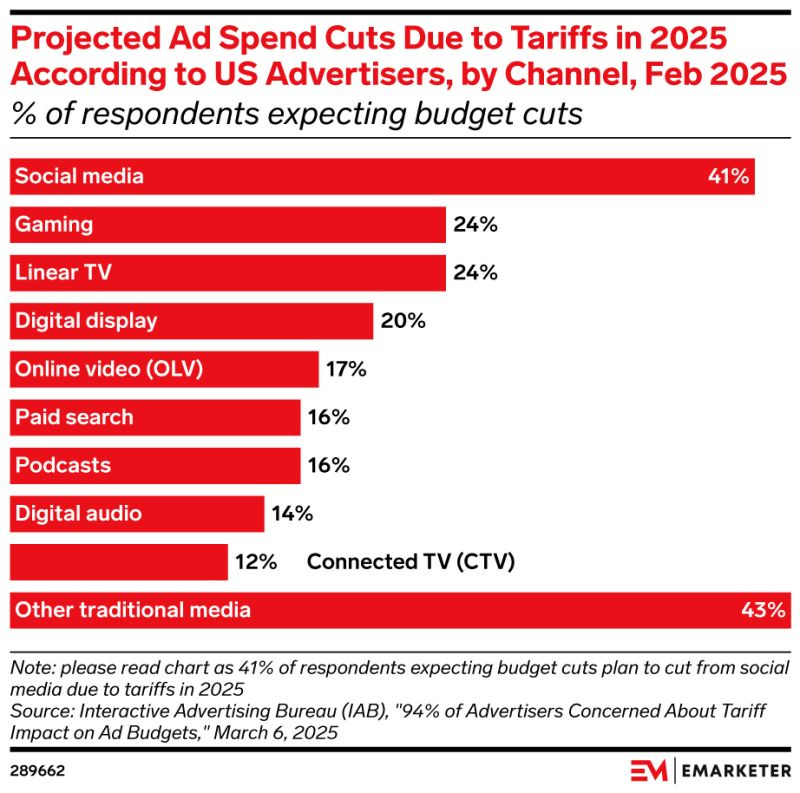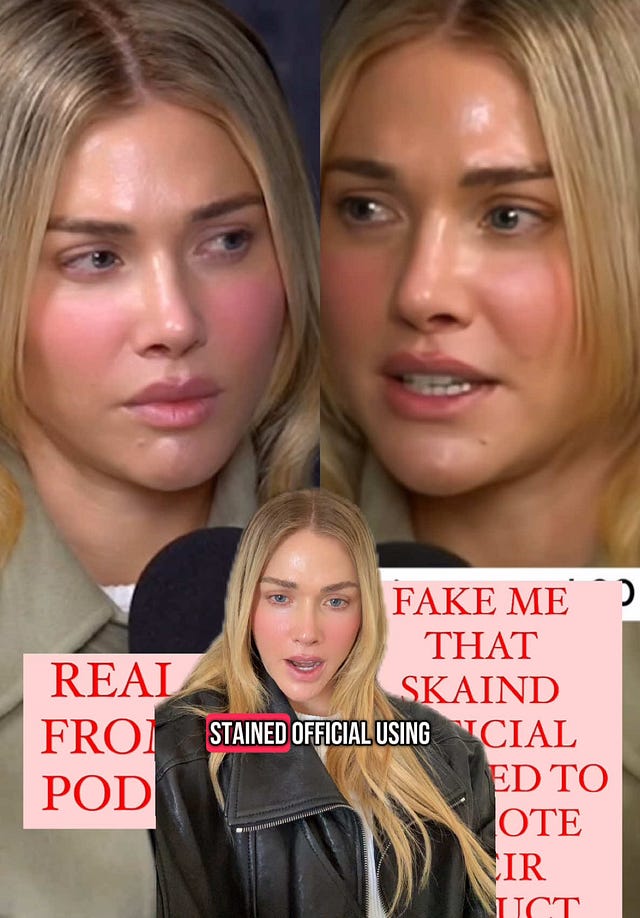April 11, 2025
It started like most MAC meetings do—casual Friday energy, a few sarcastic greetings, and then... a hard pivot into the flaming mess that is today’s marketing ecosystem.
Tariffs.
Lawsuits.
AI impersonations.
Ad tech espionage.
Oh, and laundry detergent.
Yes, welcome to the chaos. And MAC’s here to sort the mess.
Marketing Feels Normal Until You Zoom Out
Your CMO might still be polishing the latest email sequence or debating subject line A/B tests. But zoom out just a bit, and you’ll see a much darker backdrop:
Ad spend cuts are looming thanks to economic fear, tariffs, and political ping-pong.
Social media tops the list of channels brands would axe first. (Because when budgets get tight, trust dies fast.)
Meta’s legal rap sheet keeps growing. We’re talking lawsuits for antitrust, civil war incitement, data-sharing with China, and deepfakes.
MAC’s Take: If you’re pretending these aren’t your problems because you “just run campaigns,” you’re wrong. You’re operating on borrowed time and eroding trust. Do better, or get steamrolled.
Enter The Trade Desk: Privacy Violation Central
This week, a big domino fell: The Trade Desk got slapped with multiple lawsuits under California privacy law. Here’s the deal:
They pitched themselves as the cookie-less savior.
But their shiny new ID system (UID2.0) is just a persistent tracker by another name.
It tracks users across devices without consent and sends data back to fuel targeting.
Even worse? One lawsuit includes Noom and Weight Watchers, both of which dabble in pharmaceutical products. Translation: sensitive health data was being hoovered up and monetized without user knowledge.
MAC’s Take: This isn’t just a privacy issue. It’s a wake-up call. You can’t keep pretending your “pixels” are harmless. You're complicit in a system that leaks data like a sieve and puts real people at risk. If you’re not inspecting your tech stack, you’re part of the problem.
Who Is Heidi Sass, and Why Should You Listen to Her?
If this week had a North Star of common sense, it was Heidi Sass. She’s not just any privacy attorney—she’s a data privacy pitbull with a razor-sharp understanding of the marketing ecosystem and zero patience for bullshit. She’s the person who reads your entire privacy policy and checks your source code. And she does it with more public-spirited energy than most of us muster on our best day.
Heidi’s warning? The Trade Desk is in trouble, and you might be next.
They’ve been hit with multiple lawsuits for tracking users through persistent identifiers—without consent. And the kicker? Some of that data includes health information from sites like Noom and Weight Watchers, which is a privacy no-no with lawsuits written all over it.
She broke it down in plain terms: if your stack includes tools that track people without their knowledge, you’re violating consumer privacy laws. Period. It doesn’t matter what slick name you call it—cookie-less ID, server-side pixel, “smart retargeting.” If it smells like surveillance, the courts will treat it like surveillance.
And the kicker? Most marketers don’t even know what’s on their websites. Heidi helps her clients (usually small businesses) audit their tech stacks, rip out the garbage, and replace it with privacy-respecting alternatives. The result? They cut spend, reduce risk, and still get results.
Heidi’s Take, distilled:
“Data hoarding is lazy marketing. You’re not clever. You’re cornered.”
“Marketers think they need more data. What they need is less, used better.”
“And no—your tracking widget isn’t worth the class-action lawsuit it might trigger.”
MAC’s Take: She’s the MarTech Marie Kondo, and we’re obsessed.
AI, Deepfakes, and the Avatar Apocalypse
A major influencer was caught on a podcast hawking skincare... except it wasn’t her. It was an AI deepfake. Some shady brand created a fake version of her to drive affiliate clicks.
This isn’t science fiction—it’s ad fraud with a ring light and fake eyelashes. Combine that with a FinTech app founder busted for claiming AI that was actually a team of humans in the Philippines, and you’ve got a full-blown trust crisis.
MAC’s Take: Deepfakes are now marketing tools. Let that sink in. You want brand safety? Start with not letting the concept of “truth” collapse under your watch.
 Tiktok failed to load.
Tiktok failed to load.Enable 3rd party cookies or use another browser
Surveillance by Ad Stack
And let’s not forget LiveRamp—caught sending data on U.S. military members abroad to third parties. Or TikTok moderators suing for trauma from sifting through violent content for hours. Or ad tech firms quietly fueling government surveillance.
Oh, and the kicker? Most marketers don’t even know it’s happening. Heidi Sass (our resident privacy queen) shows clients what’s in their tech stack... and they’re horrified. Pixels firing without consent. Tools collecting far more than needed. No real strategy—just data hoarding.
MAC’s Take: This isn’t strategy. It’s malpractice. You don’t need a “360 view” of your customer. You need one clean, legal, respectful perspective. That’s how you win trust—and avoid court.
Data Minimalism: Not Just for Monks
Want to fix it? Start with less.
Less data.
Fewer tools.
More intention.
Heidi’s clients end up saving money, reducing risk, and—shock—actually improving their marketing outcomes. Because cleaner data = better targeting = better results. Who knew?
MAC’s Take: If your stack is 87 tracking tools deep and your consent modal is longer than “War and Peace,” you’re not clever. You’re a liability.
Then Came EarthBreeze (Yes, Really)
In a twist no one expected, EarthBreeze—the eco-friendly laundry sheet company—emerged as the week’s MVP. A simple product. A clear message. A YouTube ad that resonated. People bought. No creepy tracking required.
And just like that, the point was made: you don’t need invasive surveillance to be effective. You just need relevance.
MAC’s Take: This is what ethical, effective marketing looks like. And it's not even that hard. So why are you still chasing sketchy targeting hacks like a desperate ex?
What Now?
If you’re still clinging to the fantasy that "more data = better marketing", we have news: that’s a relic. What’s coming next is regulation, litigation, and a public that’s increasingly allergic to brands that don’t respect boundaries.
Want to survive?
Audit your stack.
Kill what you don’t use.
Get consent—or get out.
Learn how to market without manipulation.
Final Word: Why MAC Exists
MAC isn’t here to “inspire” you. We're here to drag you into reality before your brand ends up on a class-action lawsuit or gets roasted in Congress.
We’re building a movement for marketers who give a damn—about ethics, effectiveness, and yes, the humans on the other end of the screen.
So before you drop another dime on “behavioral targeting,” ask yourself:
Is this really worth it?
Because the bill’s coming due—and MAC will be here to read the fine print out loud.





















Share this post